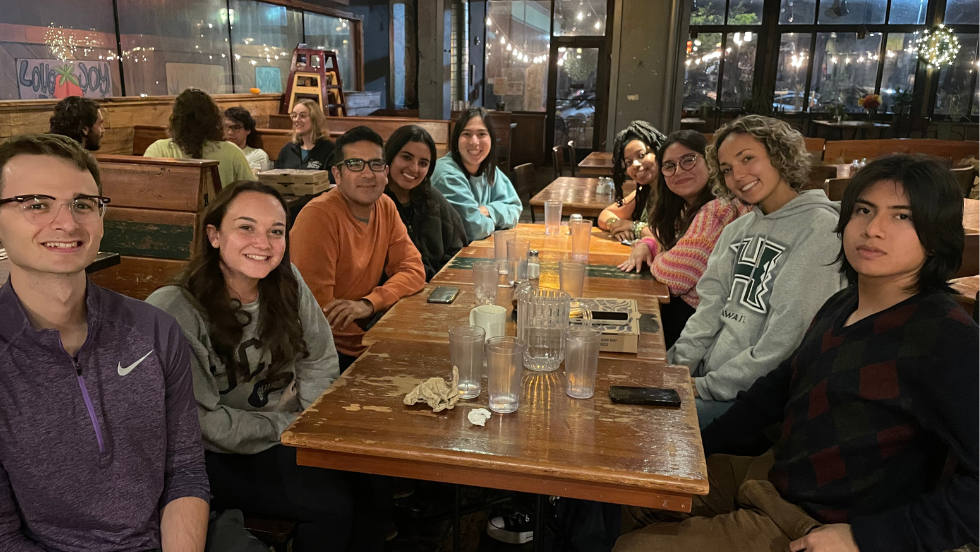Professor David Rangel, an Assistant Professor of Education, is deeply committed to mentoring undergraduate students in academic research. His work spans a range of critical topics, including the impact of COVID-19 on special education and the intersections of work, family, and schooling in low-income Latinx communities during periods of strict immigration enforcement. Beyond his research, Rangel sees mentorship as an investment in the future of academia, shaping the next generation of scholars through hands-on experience and meaningful collaboration.
This is the second article in a three-part series on Professor Rangel’s research and mentorship. In our first article, we explored his latest research on race, class, and education in Latinx families. Now, we turn to his approach to mentoring undergraduate researchers.
A Structured Path to Research
Rangel’s mentorship process begins early in a student’s academic journey. He identifies potential research assistants in his courses, guiding them through foundational readings before introducing them to qualitative research methods. His structured approach ensures students gradually build on necessary skills before taking on active research roles.
“The first semester, we just feel things out,” Rangel explains. “I give students a lot of reading on the research topic I’m studying at the time, then provide training so they can eventually be full collaborators on papers with me.”
Students first observe the research process, then practice key skills like conducting interviews, analyzing data, and engaging in academic concepts and ideas. By structuring their learning, Rangel ensures they gain confidence and competence before contributing to major projects.
Central to Rangel’s mentoring philosophy is a commitment to working with students from diverse, underrepresented backgrounds in research. Many of his past and current undergraduate Research Assistants come from historically marginalized communities.
From Learners to Collaborators: The COVID-19 Project
Rangel’s commitment to mentorship was evident in his work on Inequality in the Schooling Experiences of Disabled Children and their Families during COVID-19. Recognizing an opportunity for hands-on learning, he connected two of his students—both new to research—with a special education expert at NYU. This collaboration evolved into a full-scale research project involving all four scholars.
“Neither student had conducted research before, so it was an intensive process,” Rangel recalls. “We guided them through every step—teaching research methodologies, developing their interviewing skills, facilitating practice sessions, and providing feedback before they conducted real interviews.”
The students took an active role in shaping the project, from designing research questions to collecting and analyzing data. Their findings not only contributed to the larger study but also informed their individual theses. Rangel underscored the value of such experiential learning:
“That kind of experience is something you can’t just teach in a classroom. It has to be lived.”
Earning Co-Authorship: The Latinx Communities Study
Rangel ensures that students don’t just assist with research but make substantive contributions. This philosophy is reflected in A Qualitative Examination of Work, Families, and Schools in Low-Income Latinx Communities During Strict Immigration Enforcement, where undergraduate researchers were involved at every stage, from data familiarization to manuscript development.
“Co-authorship isn’t a token reward,” Rangel says. “Students have to make central contributions, whether by generating new ideas, intervening in the project in unique ways, or carving out research distinctions beyond what I assign them.”
Unlike the COVID-19 project, which emerged from students' interests, this study followed a traditional mentorship model. Rangel recruited students early, trained them in qualitative coding and theoretical engagement, and encouraged them to contribute their own insights. Students earned co-authorship by demonstrating strong analytical skills and contributing significantly to the projects.
Challenges and the Bigger Picture
Mentoring undergraduate researchers comes with challenges. Unlike doctoral students, they often enter the research process with limited experience in qualitative analysis, academic writing, and theoretical framing. Bridging this gap takes time, with no guarantee that every student will reach the level necessary for co-authorship.
“One of the biggest challenges is that undergrads often start with topics rather than researchable questions,” Rangel explains. “A big part of my role is helping them refine their interests into questions that haven’t already been answered.”
Despite these challenges, Rangel remains committed to mentorship, seeing it as an investment in the field and expanding the range of voices in academic discussions.
“The way to transform academia isn’t just by hoping for changes,” Rangel asserts. “It’s by actively cultivating the scholars who will shape its future.”
